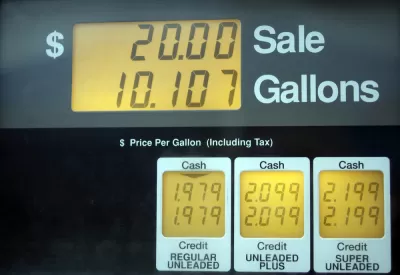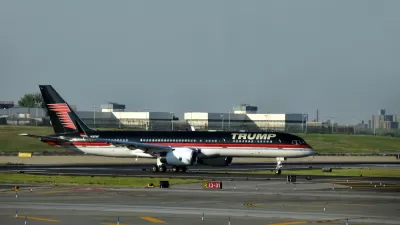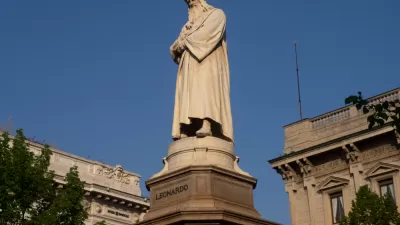Like so many of the president's assertions, the statement, made in a Bloomberg interview on Monday morning, could be open to interpretation, but he's gone where none of his predecessors since Bill Clinton on the issue of raising the gas tax.

When the issue of raising gas taxes arose at the start of the previous administration, President Obama made it clear that he would oppose raising the 18.4 cent per gallon federal gas tax, not increased since 1993 by President Bill Clinton. It violated his pledge not to raise taxes on the middle class.
While his Democratic rival, Hillary Clinton, repeated that pledge, candidate Trump did not. In fact, as Politifact acknowledges, "15 of the 17 GOP candidates had signed no-tax-hike pledges - not just the middle class but everyone." Jeb Bush and Donald Trump were the exceptions.
Damian Paletta, White House economic policy reporter for The Washington Post, reports on the May 1 Bloomberg interview on the issue of hiking the gas tax.
“It’s something that I would certainly consider” [emphasis added], Bloomberg quoted Trump as saying. The president added that he would be inclined to back the idea “if we earmarked money toward the highways.”
Paletta adds that the context of the remark was funding Trump's much touted $1 trillion infrastructure plan, few details of which have been released.
Aides have said the package would be financed by roughly $200 billion in federal money, with the rest coming from private financing. But Trump has also suggested that he could back a plan that received only federal support.
Heretofore, "federal support" meant general fund transfers which would would either be offset, or added to the growing federal deficit. Private funding has been widely interpreted to mean that user fees, such as tolls, would have to be charged, which would rule out many projects, such as rural roads.
Hiking fuel taxes to pay for infrastructure would allow for public financing without need to offset or add to the deficit, and provides an alternative, or supplement to "tax credits for developers," which Senate Minority Leader Charles E. Schumer (D-N.Y.) has stated he would not support.
Polling in January showed that "66 percent of those surveyed said they oppose a plan that would grant close to $140 billion in tax credits to investors who put their money into roads, bridges and transit in return for the right to impose tolls." However, that poll didn't ask how respondents would view increasing gas taxes to pay for those investments.
In the interview, Trump pointed to support by truckers' groups for raising fuel taxes (yes, even diesel taxes) provided funds are used for road infrastructure.
Trump released a one-page tax plan on April 26 that was silent on a gas tax, write the Bloomberg reporters who conducted the interview. They add:
White House Press Secretary Sean Spicer said Monday afternoon that Trump isn’t specifically supporting an increase -- but the president is keeping an open mind about it “out of respect” for trucking-industry interests who Spicer said support an increase as a way to pay for needed road improvements.
Perhaps all this "consideration" was merely throwing a bone to the trucking industry, who are known to be staunch opponents of road tolls?
FULL STORY: Trump says he’d consider increasing the gas tax

Trump Administration Could Effectively End Housing Voucher Program
Federal officials are eyeing major cuts to the Section 8 program that helps millions of low-income households pay rent.

Planetizen Federal Action Tracker
A weekly monitor of how Trump’s orders and actions are impacting planners and planning in America.

The 120 Year Old Tiny Home Villages That Sheltered San Francisco’s Earthquake Refugees
More than a century ago, San Francisco mobilized to house thousands of residents displaced by the 1906 earthquake. Could their strategy offer a model for the present?

Alabama School Forestry Initiative Brings Trees to Schoolyards
Trees can improve physical and mental health for students and commnity members.

NYC Outdoor Dining Could Get a Re-Do
The city council is considering making the al fresco dining program year-round to address cost concerns from small businesses.

HSR Reaches Key Settlement in Northern California City
The state’s high-speed rail authority reached an agreement with Millbrae, a key city on the train’s proposed route to San Francisco.
Urban Design for Planners 1: Software Tools
This six-course series explores essential urban design concepts using open source software and equips planners with the tools they need to participate fully in the urban design process.
Planning for Universal Design
Learn the tools for implementing Universal Design in planning regulations.
Ada County Highway District
Clanton & Associates, Inc.
Jessamine County Fiscal Court
Institute for Housing and Urban Development Studies (IHS)
City of Grandview
Harvard GSD Executive Education
Toledo-Lucas County Plan Commissions
Salt Lake City
NYU Wagner Graduate School of Public Service





























